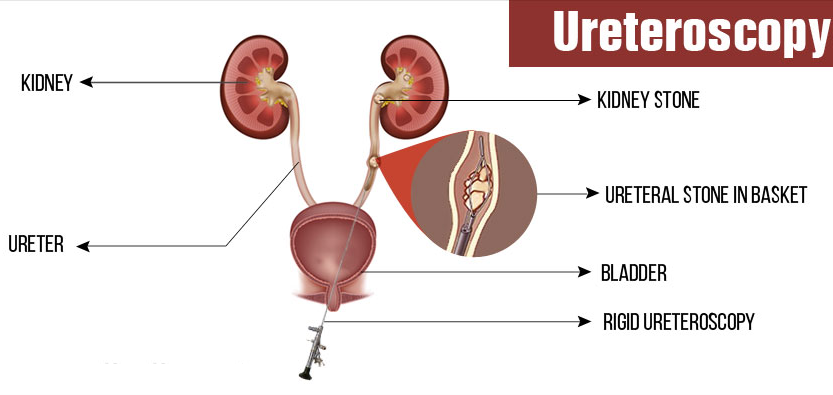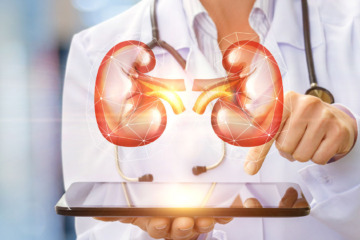Urinary stones
What causes formation of urinary stones?
Urinary stones are formed when the concentration of salts in the urine is very high. In such situation a crystal forms in urine inside the kidney. If the concentration of salts still remains high, more and more such crystals form and keep depositing on the surface of crystal that had formed initially. More and more crystal deposition increases the size of stone hence formed.
Can the stones be dissolved in the kidney itself using medications?
Yes, there are medications to dissolve the stones in kidney itself. The possibility of medical dissolution depends on the composition of stone. Uric acid and cystein stones can be dissolved using medications. However, most calcium oxalate constitutes the most common type of urinary stone formed globally. No medications can dissolve this stone.
Can stones pass out in urine spontaneously?
Yes, small stones can come out in urine spontaneously. If the stone is more than 7mm, the likelihood that it will pass reduces and the risk of waiting is unacceptably high. There are medications available to facilitate spontaneous expulsion of stones.
If the stone is large, what are the modalities of treatment?
Stones can be managed using the following modalities:
1. Extracorporeal shock wave lithotripsy: In this mode of treatment the electromagnetic shock waves are used to break the stones into smaller particles. The patient lies on a table. X ray machine is used to focus the shock waves on the stone and stone is fragmented. Once the stone is broken into smaller fragments, the tendency of these smaller fragments to pass in urine is increased. The drawback of this modality is that the stone is fragmented only and not removed completely. If the body fails to expel the stone fragments, ancillary procedures may be required for their removal.
2. Ureteroscopy (URS):Ureteroscopy (URS): If the stone is stuck in the pipe of kidney that carries the urine from kidney to urinary bladder (ureter) in its mid or lower portion, a long semi-rigid metallic camera rod is introduced into the penis-bladder-ureter. The stone is visualized and fragmented using laser. All the fragments are removed in one sitting only.


3. Retrograde intrarenal surgery (RIRS): If the stone is in the kidney or upper part of ureter it is removed using this procedure. In this procedure a long flexible scope is introduced into the tip of penis-bladder-ureter-kidney. All the stones in upper ureter and kidney are visualized and pulverized to dust using laser. This procedure is feasible if the size of stone is less than 15mm.

Percutaneous nephrolithotripsy (PCNL): If there is large stone burden in kidney, then this procedure is useful. In this procedure a small hole of around 1 cm diameter is drilled in the back. A camera is introduced in the kidney through this hole. The stones are visualized and broken using laser. All the stones are removed through this hole, out of the body. To close this hole after the procedure, 1 stitch might be placed.
Can stones form again after removal?
Yes, urinary stones can form again. It does not depend upon what modality if used to remove the stone originally. There is an underlying cause why the stone formed in the first place. We have removed the stone, but the cause has remained unaddressed. Until we address that, there will be tendency to form stones again. It is recommended to analyze the stone for its chemical composition to see what formed the stone. There is battery of blood and urine tests as well that help us to detect the underlying abnormality. Once we identify the underlying metabolic anomaly and composition of stone, specific steps can be taken to prevent stone recurrence.
If the stone is not causing me any problem, why should I get it treated?
The most dreadful type of stones is the one which don’t cause pain as the patient doesn’t seek any treatment sometimes. Pain is a good sign. It is a sign of life. If there is no pain, it may mean that the kidney is already dead. Even if the stone does not cause any pain, it may damage the kidney, can cause recurrent infection in urine, can cause passage of blood in urine. In long term it may also cause kidney cancer.
What can I do to prevent formation of stones?
Follow the following advice:
- Drink plenty of water around 4-5 liters in a day. Observe the colour of urine. It should be as clear as drinking water at all times. If the urine is yellow, go and drink 2 more glasses of water.
- Restrict salt intake. Salt can be added to meals to taste, but there should be no added salt. In between meals avoid taking salty snacks.
- Avoid cola based drinks.
- Consumption of orange juice and lemon juice is helpful to prevent stones.
- Avoid junk food.
- Control your weight. Ideal adult body weight is height in cm-100. So kindly maintain the weight around this figure.
- Consume milk only during meals. Don’t consume milk independent of meals.
- Avoid taking vegetables with seeds more than once a day. Take a glass of milk with the meal if you are eating palak or a seedy vegetable.
- Avoid dates, chocolates, sitafal.
- Avoid excessive non-vegetarian food. Once in 15 days is ok and preferably take chicken or fish. Avoid red meat.
If you are happy with your visit and are getting better please write a review:
You can google drsumiturologist or Deetyaclinic: there will be a business page towards right side. Please write a review and help us grow.



Good post. I learn something totally new and challenging on blogs I stumbleupon on a daily basis. Its always useful to read content from other authors and practice something from their websites.